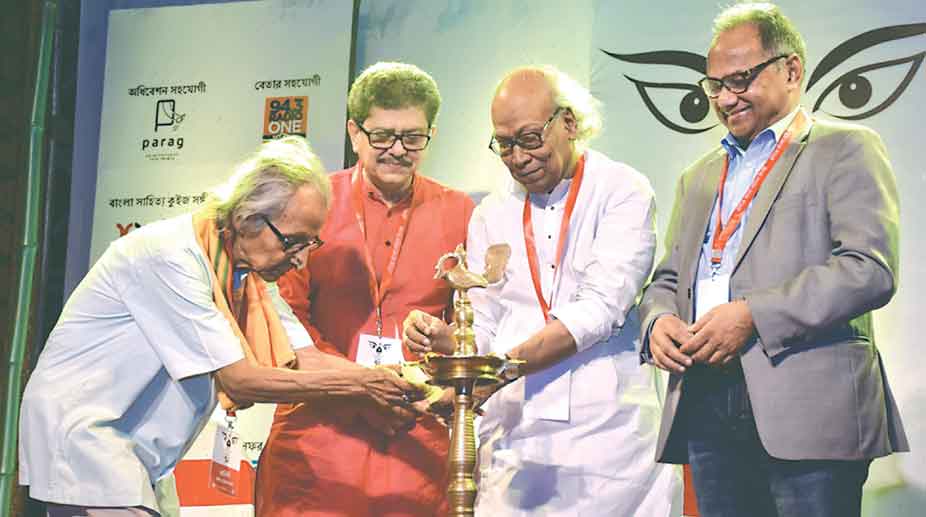Interview | Entertainment doesn’t have to be brainless:Bengali actor Abir Chatterjee
I personally don’t believe in things like method acting, I think I am not a method actor.

From left: Sanjib Chattopadhyay, Tridib Chattopadhay, Shankha Ghosh and Imdadul Haq Milon
It was an unprecedented opportunity for everyone present to listen to one of the stalwarts of Bengali literature, Sanjib Chattopadhyay, at the Apeejay Bangla Sahityo Utsab in Kolkata. While delivering the keynote address on Bangla sahitye’r haal haqiqat (The State of Bengali Literature), the venerated author of hard-hitting satirical stories was at his witty best. “According to the scenario today, we must grab boys and girls by the neck and make them read lots and lots of books. If not read, at least buy them”, he said.
Bengali is an ancient language and blessed with a rich literary legacy even before classic writers like Bankim Chandra Chattopadhyay, Sarat Chandra Chattopadhyay and Bibhutibhushan Bandyopadhyay came on the scene. And it’s the responsibility of people in this generation to keep the flag flying high. His good-humoured jibe on the way Bengali is spoken these days with smatterings of English, Hindi and Urdu was on point as that is doing the language a great disservice.
In his inimitable way, Chattopadhyay said that authors are now expected to write something jeta public khaye (that the public would consume). “I have heard of people eating cutlets, sweets and rice but how do they eat writing?” It seems one must make people consume their writing and for that one would have to introduce popular elements. According to many publishers the story must be stuffed with a bit of everything — from politics and pathos to humour, household squabbles and adult problems. Throwing in a couple of murders to inject some suspense would draw applause or land one a movie contract! Chattopadhyay said, “How to make the pen even mightier? ‘Add masala! Add more ingredients!’ they say. So there is no difference left between cooking and writing.”
Advertisement
Chattopadhyay shared his many experiences in the world of literature, which was a privilege for the audience. “I began observing the situation around me whether it was politics, education or religion. Gradually I reached a place from where I wanted to protest. But I didn’t have a sword to fight a duel or a gun to go around shooting people with. That’s when I thought of writing satires and unmasking society with sweet words of praise. Once I did that I was really excited to discover that I was able to say a lot of things and the language was building itself accordingly,” he said.
Chattopadhyay earnestly follows the words that eminent writer Bimal Kar once told him, “Don’t try to become like your readers to make them read. Every writer works on individual themes, which depend on the kind of life he has lived and the struggles he had to endure.Writing comes from a strong feeling that refuses to be subdued.”
Writer Samaresh Basu, who once told him that stories must be written by sitting inside it, also inspires him. The writer is the central character and the whole thing revolves around him. If one has the strength of imagination, one must try writing about the life that he hasn’t seen and turn it into reality. For instance, if a writer sees a dead boy lying on the road after getting hit by a car, his vision wouldn’t stop there. He might see a girl of the same age as the boy slowly approaching the corpse, looking upon it and thinking how his life’s journey has come to an end while she is still living.
Relating an apparently comic incident of his life, Chattopadhyay presented a perturbing picture of the declining value assigned to books. “Once I was sitting at a Book Fair when a man came and asked for a book of a certain size. When I asked why, he said that he wanted to replace an empty space of the same size on his bookshelf. I found a packet-like thing resembling a book and gave it to him for free. His purpose was served and he happily took it home.
Some shelves have books that no one ever reads; some books are kept in the loft, which are never brought down and some manuscripts never reach the house of publishers. Writers must make sure that their works never suffer such a fate,” he said.
Advertisement